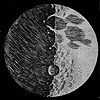|
za 2004 god.
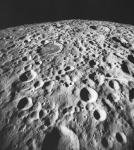 An Excess of Craters
An Excess of Craters
24.07.2004 | Lunnoe foto dnya
I worked my way through college by measuring lunar craters for the System of Lunar Craters catalog published by the Lunar & Planetary Lab in the early 1960s. I am glad that this image of the middle of the lunar farside was not available then - it is a crater counter's nightmare!
 Sun, Moon and Stars
Sun, Moon and Stars
23.07.2004 | Lunnoe foto dnya
How often can you see an image of the Moon, Sun, Venus (pink dot) and stars all in one frame? This dramatic view from a decade ago was taken by the Clementine lunar orbiter's Startracker camera.
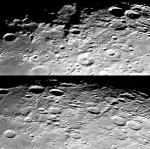 Huge Fractures
Huge Fractures
22.07.2004 | Lunnoe foto dnya
These images are remarkable in showing the tectonic structure southeast of Mare Nectaris. And because Bob Botts took images on successive nights of the waning Moon we can see the same area illuminated and then deeply shadowed. The area SE of Nectaris is well known for its strong and conspicuous radial basin structures.
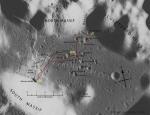 Taurus-Littrow Route Map
Taurus-Littrow Route Map
21.07.2004 | Lunnoe foto dnya
With the use of a rover, astronauts on the last three Apollo missions could travel so far that a route map was need before the mission and afterwards to get a geographical (or selenographical for purists) understanding of their explorations.
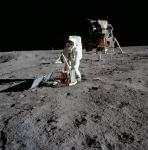 The Beginning of the End of the Future
The Beginning of the End of the Future
20.07.2004 | Lunnoe foto dnya
Thirty-five years ago today humans took the first step onto another world. The picture demonstrates that we - in this case Edwin Aldrin setting up a seismic station - could do meaningful work on another planetary surface. And with the odd contraption in the background, we could land, take off and fly through space.
 The Best Lunar Lava Flow
The Best Lunar Lava Flow
19.07.2004 | Lunnoe foto dnya
Samples brought from the Moon confirmed that the maria are made of basaltic lava. But their ages are so ancient that little morphological evidence remains of the millions of individual lava flows that built the thick mare piles. Only one set of relatively young lava flows - perhaps 2.5 billion years - is still detectable, barely.
 A New Hit DVD
A New Hit DVD
18.07.2004 | Lunnoe foto dnya
The Lunar & Planetary Institute in Houston, TX facilitates and promotes studies of the Moon and planets. LPI is famous for co-hosting the annual Lunar and Planetary Science Conference for the last 35 years. And they are making a huge contribution to lunar studies by digitizing and posting online thousands of lunar photos and maps.
 Our Moon
Our Moon
17.07.2004 | Lunnoe foto dnya
During the 1800s lunar studies were dominated by the great German selenographers: Schroeter, Lohrmann, Madler and Schmidt. In the late 1800s and the 1900s the Moon mapping mantle passed to the British: Nasmyth and Carpenter, Neison, Elger, Goodacre, and Wilkins and Moore.
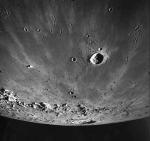 Raisin Pits
Raisin Pits
16.07.2004 | Lunnoe foto dnya
Rays and pits go hand in hand. The formation of crater rays was one of the totally misunderstood features on the Moon until Gene Shoemaker studied Meteor Crater in Arizona in the 1950s.
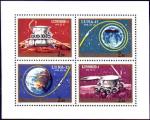 Licking the Moon
Licking the Moon
15.07.2004 | Lunnoe foto dnya
During the 1960s and 70s the space race competition was played out not only with rockets and probes but also with stamps. And the winner here was clear - the Soviet Union and its Eastern Europe colonies issued hundreds to thousands of different colorful and fascinating space stamps.
